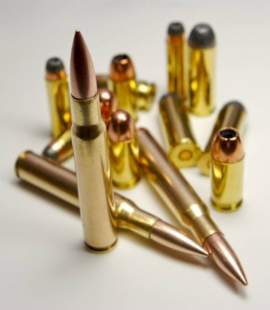
Ammunition Explained

Background
Firearms are a powerful tool that ultimately exist for the purpose of self-defense, survival, and in this day and age, hunting and sporting practices as well. However, a firearm is rendered useless without any ammunition. Ammunition can be defined simply as the bullets or projectiles that are discharged from a firearm. However, it is important to understand the many components of and how it works in order to truly have an understanding of firearms and guns in general.
Being such a crucial component to the firearm, a gun user should be able to identify the various components of a cartridge and how it functions to essentially reach its purpose of hitting a target. It also important to know what ammunition is and how it works in order to be fully aware of the potential dangers that may occur in the mishandling of ammunition, and become better aware of gun safety in general.
Specific Laws
As laws exists for the regulation of firearms, it is common sense that laws would also exist for the regulation of ammunition. The regulation of ammunition is a federal and state imposed legislation. The federals currently in place give a basic outline of those who are not allowed to purchase, possess, or carry any kind of ammunition. Generally speaking, those that have felony conviction, a history of violence, and/or under the age of 18 are all prohibited from ammunition. This serves as the basic federal guidelines to firearms as well. However, the state-imposed regulations tend to be more specific and further restrict the laws as written by the federal government.
Several states have laws that limit the sell and purchase of specific type of ammunition to a specific age requirement, other states expand on the list of disqualifying factors that would bar individuals from buying or owning ammunition. As with firearm laws, state laws regarding ammunition are often extremely specific, and at times, can be confusing. It is important for individuals that have an interest or own firearms to be informed on their perspective state's legislature regarding ammunition as well. After all, a firearm is useless without ammunition, and an individual has the responsibility of knowing and adhering to state and local laws.
Purchasing Ammunition
The purchasing of ammunition may seem to be easier to accomplish than purchasing an actual firearm. Without a firearm, a bullet is essentially harmless, so acquiring them would probably not be as difficult. This idea is one that is based entirely on misguided though and misinformation. The fact is that ammunition is just as strictly regulated as are firearms.
Though many states do not require a proper permit for the purchase of firearms, the law imposes certain assurances so that only qualified individuals may buy a weapon. The same is with ammunition; there are state and federal laws that restrict the sale or possession of ammunition to individuals that are not qualified. Furthermore, certain states impose their own restrictions, such as raising the age requirement, limiting the type of ammunition, and limiting ammunition capacity of magazines. Individuals must fully comply with the state and federal regulations and should make it their responsibility to be full aware and understand what these regulations and rules are and how they apply to them.
Ease of Buying Certain Ammunition at Sporting Good Stores
As it stands, there are regulations regarding the sell of ammunition that are specified under federal and state law. Generally speaking, federal laws serve mostly as a guideline, allowing states to improve or further restrict the imposed provisions, as long as they are not in violation or infringement of federal laws.
Buying ammunition at a sporting goods store is simple as providing verification of age; 18 to purchase shotgun and rifle ammunition, and 21 to purchase handgun ammunition. Currently, there is no background checks conducted to purchase ammo. Therefore, there is a relative ease that can be found by purchasing ammunition at sporting good store or famous chain such as Modell's or Dick's Sporting Goods. It offers convenience and quite possibly, lower prices as well. However, it has been questioned that such relatively ease may allow ammunition to fall in to the hands of those who may not be qualified to purchase or possess ammunition.
Recently, there has been political debate regarding imposing a new system for buying ammunition to compensate for the lack of instant background criminal checks. California has been one of the first to introduce such provision in to law. It is unsure if this will deter people such as felons from attempting to buy ammunition at sporting goods stores, but the decision for enacting the policy is already being met with considerable opposition.
Components of Ammunition
Ammunition is one the most essential components of a firearm--and arguably the most important. Though what most people call a "bullet" is generally such a small object--comparable to the size of a standard AA battery in conventional firearms--there are amazingly complex in their structure and internal functions. The fact that most people use the term "bullet" in referring to this type of ammunition, it is technically incorrect; a bullet is only but a component of ammunition. The are basic components in ammunition used in firearms.
They are the cartridge--which is what most call a "bullet"--primer, propelling agent, rim, and casing. Though the components will vary depending on the type of ammunition, these are what can be considered as the basic components in conventional firearm ammunition.
Aside from having various components, the components themselves are constructed in various ways using different types of materials depending on the intended purpose or use of the ammunition. There different types of bullets, propellants, and primers depending on the firearm employed and the overall purpose of the ammunition. It is often overlooked by non-firearm users and firearm users how intricate the function is of a weapon's minute, but deadly killing agent.
Types of Ammunition
Just as there many different types of firearms, there are just as many and possibly more, different types of ammunition. Types of ammunition can vary greatly and often depend on what the ammunition is being for and what the intended purpose is. Ammunition types vary greatly simply in terms of scale and scope. There is firearm ammunition, naval ammunition, ordnance ammunition, air craft ammunition, and tank ammunition just to list a few.
However, in civilian terms and purpose, the concern about the different ammunition types will refer to small firearms, such as shotguns, rifles, and handguns. Even at this scale, the types of ammunition available is quite astounding. In seeking to purchase ammunition, an individual must be aware of several aspects in order to choose the correct ammunition for his/her firearm. Commonly, the caliber or gauge and intended use are considered during the purchasing process. It is also important to be aware of any regulations that may exist regarding certain types of ammunition, so as to not infringe upon local, state, or federal laws.
Illegal and Controversial Ammunition
There is much heated debate regarding the Second Amendment of the Bill of Rights in the United States. The opposing sides, those who want gun rights, and those who want gun control, are currently engaged in a battle of political wit and words that has been in a perpetual stalemate since the whole thing began. Regardless of political allegiance, the fact is that there are rules and regulations currently in place by federal and state laws regarding firearms. This is also expanded to include firearm ammunition as well. The most controversial and often debated types of ammunition are armor piercing bullets and hollow tip or hollow point bullets.
Some states have already taken proper measure to prohibit and outlaw armor piercing ammunition. Hollow points, while not legally barred, as still the subject of debate by people defending the stance that they are safer than ordinary bullets, while those attacking the aspect that they cause more harm when used on people and animals.



















